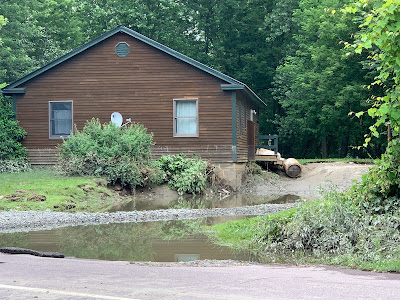More importantly what are we going to do about that cost?
The Vermont Legislature is among those asking those questions. And they have another question: Who should pay?
Here's what VTDigger reports:
"A slew of state lawmakers - 20 out of 30 senators and 87 out of 150 representatives - are invoking a precept from kindergarten. The person who made the mess should clean it up."
The Vermont legislature is looking at you, fossil fuel industry.
SUPERFUND
The legislations really isn't that much different from the federal pollution Superfund idea that's been running for decades. Big businesses that create hazardous waste pay for pollution cleanup.
The climate superfund idea means we now have two companion bills, one in the Vermont House the other in the Senate, that would establish a climate change "superfund."
Vermont Public explains how this would work:
"Companies that produced more than 1 billion metric tons of carbon dioxide equivalent between 2000 and 2019 would have to pay a share of what climate change has cost Vermont, based on how much the company contributed to global emissions during the same period."
Environmental groups in the state have been lobbying for this sort of thing and are happy the bills have been introduced.
There's no doubt climate change is already costing a lot of money. The big flood in July - very likely supercharged by a warming world - will end up costing Vermonters more than $1 billion, notes Vermont Public.
Vermont Public also reminds us that a 2021 University of Vermont study estimated climate change fuels flooding in just the Lake Champlain basin could end up costing $5 billion by the end of this century.
Never mind flooding elsewhere in the state, larger storms, more wind damage, searing heat and other hazards brought on by a changing climate.
But how much money should Vermont collect and how do we do the accounting?
The answer in the legislation is somebody will have to do some detailed and accurate accounting of the damage in Vermont due to climate change. The legislation says that somebody is Vermont State Treasurer Mike Pieciak, and the would have to get that accounting done by 2025.
Pieciak told Vermont Public he's excited about the task and he thinks he and his staff can gather an accounting of damages in the Green Mountain State due to climate change. Pieciak says he expects the accounting to be airtight and able to withstand litigation.
It'll have to.
The legislation might be a great idea, but good luck collecting the money.
"The idea is to target companies that produced fossil fuels between the start of 2000 and the end of 2019 resulting in the emission of at least one billion metric tons of greenhouse gasses. Each of those companies would be held liable for its proportion of the cost of those emissions to the state. The 'cost recovery' payments would go into the 'climate superfund' earmarked for infrastructure projects that help Vermont adapt to climate change."
Awesome!
But it's not like the fossil fuel industry is going to start enthusiastically writing checks to the State of Vermont.
First of all, VTDigger says Vermont's governor, Phil Scott, isn't sure he's on board with this. The Republican is rather pro-business, so this idea might give him pause.
On the other hand, Scott isn't exactly enthusiastic about relying on taxpayers to fund recovery from climate disasters. He says (reasonably enough) that Vermonter are taxed enough.
No doubt Scott is aware of this little tidbit from VTDigger:
"According to the ominously-named Vermont Atlas of Disaster report, the Green Mountain State ranks fifth in the nation for per-capita spending on climate disasters. And conversations among lawmakers this year make clear that Vermont taxpayers don't have much more to give."
Let's say Scott decides to sign the bill, or he vetoes it but the legislature overrides the veto. Then what?
I guarantee the businesses Vermont targets for payments would sue. However, at least some Vermont Legislators are cautiously optimistic.
"Rep. Martin LaLonde, D-South Burlington, who is a lawyer himself, said lawmakers 'can't judge, in the end, whether this is going to make it all the way through the court cases." Still, he said lawmakers have worked with the Vermont Attorney General's Office and legislative counsel, 'and we're all confident that we have a very good case to make.'"
Well, maybe in the lower courts.
But I see this sort of thing making it all the way to the U.S. Supreme Court. The current makeup of that court is probably the most right wing in memory, so they won't go for it.
Still, I have to give lawmakers credit for trying. It's time, anyway, to keep pushing for solutions rather than just giving up. Even if the U.S. Supreme Court does prove unsympathetic.
Meanwhile, U.S. Sen. Bernie Sanders introduced a climate superfund bill at the federal level which would act much like the Vermont idea. Other states like Maryland, New York and Massachusetts have also introduced climate superfund bills, says Vermont Public.
Court cases and litigation will surely postpone Vermont's climate superfund and similar plans in other states and on the national level.
However, I doubt the push to make the fossil fuel industry pay for climate change will go away. It'll be a long slog, like the battle to make the tobacco industry pay for the harm it caused.
Climate change is obviously an even bigger deal than the health havoc created by cigarettes.


No comments:
Post a Comment